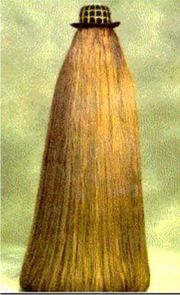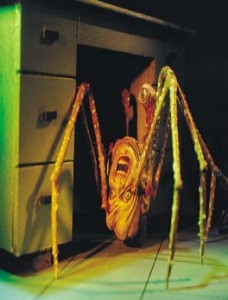[ Eejits and Sex Puppets ]
Of everything we’re read this semester, the eejits in House of the Scorpion are strangely similar to the sex puppets from Neuromancer. Because House of the Scorpion is a young adult novel and, as far as I’ve read, does not feature any blatant sex, I feel a little strange comparing it to Neuromancer, which didn’t shy away from sex at all due to its different target audience. Anyway –
For Molly to obtain the money for her technological enhancements in Neuromancer, a “cut out chip” was implanted in her body (pg 142). Similarly, eejits are simply defined as, “People with computer chips in their bodies; also known as zombies” (Cast of Characters). Yet what separates these computer chips placed in sex puppets and eejits are their effects.
Molly didn’t know what was happening to her while men used her body for sex because puppets are not conscious while on the job. Molly describes it as “blank” and “Silver.” She has us assume that the cut out chip does all the work during sex for her. Likewise, eejits show no indication of knowing what’s happening to them. They must be given instructions verbally to do anything – work, eat, drink, survive. When Matt encounters Rosa in her eejit form for the first time, he states, “The hard bitter lines of her face seemed unconnected with anything going on inside. Rosa gazed straight ahead…It was unclear whether she even saw him” (pg 147). Both descriptions of puppets and eejits delineate a sense of vacancy in the person. The person is present physically, but not emotionally.
Physical soreness the morning after is the only consequence Molly experiences until she begins to remember what’s happening to her through bad dreams due to malfunctions between her new additions and the cut out chip. While this may seem like a difference from eejits, the ability to remember what’s happening during the “vacant, blank” state may be a commonality. Matt says, “”If there was anything left of Rosa, it was locked in an iron box. He imagined her banging on the walls with her fists, but no one came to open the door. He’d read that come patients hear everything people say and need voices to keep their brains alive” (pg 167). In both cases, the conscious mind still exists but isn’t operable. As far as I’ve read, I’m not sure if eejits can be brought back from their zombie-like state. I guess that they may have some memory of what’s happened to them, but the price of surgically removing the implant is expensive.
I should note that Molly’s cut-out chip seems to have an on/off lightswitch-like operation, where as the eejit implant is something that, once inserted, keeps working until removed. In a way, perhaps eejits could be used for sex, since they seem to be used for everything else.



